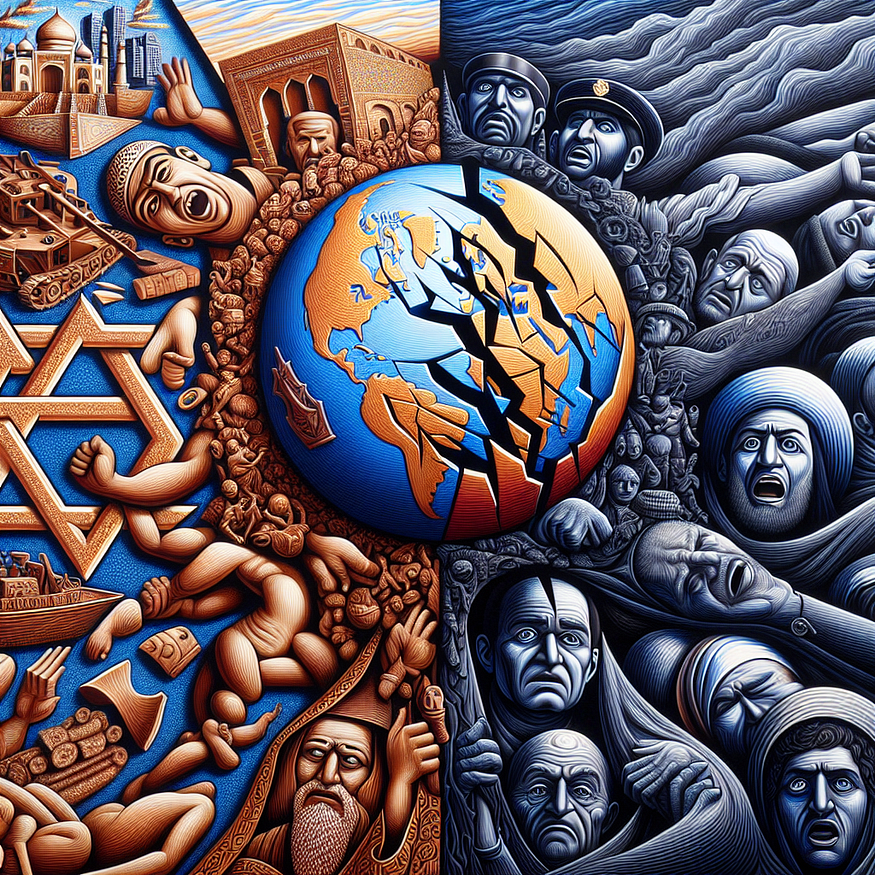by David Sawin 4/24/2024

You’ve probably seen the headlines, alarming videos, and heated debates circling around the growing tensions between Iran and Israel. But let’s take a step back and view this not just as a political or military stand-off but through a humanitarian lens. What’s at stake here is not only regional stability but real human lives and potentially far-reaching global impacts.
Understanding the human cost involves acknowledging the fear, displacement, and uncertainty faced by millions living within reach of conflict. Families, communities, and entire generations find themselves caught in the crossfire, often with devastating consequences. Beyond immediate physical danger, the psychological trauma of living in a constant state of alert can have long-lasting effects, shaping the mental health landscape of the region for years to come. The international community must not only strive for a diplomatic resolution but also prioritize humanitarian aid and support systems for those affected.
The Precipice of Conflict
It began eerily quiet but has rapidly evolved into a cacophony of threats and skirmishes, each echoing the potential for a broader conflict. But beyond the strategic moves on the chessboard of international politics lies a pressing concern: the human element.
The voices of those caught in the crossfire, the displaced families, and the youth whose futures hang in the balance are often drowned out by the clamor of geopolitical maneuvering. It’s their stories, their fears, and their hopes that bear the true cost of these conflicts. Understanding this human element is not just a moral imperative; it’s essential for crafting solutions that are not only strategic but also compassionate and sustainable. Without this perspective, any attempt at resolution risks being a mere band-aid on a festering wound, failing to address the deeper issues at play.

An Unfolding Humanitarian Crisis
Each time a missile is sent soaring into the sky or a sanction is decided upon and implemented, it’s not just a statement of power or a measure of enforcement. Deep within the core of these actions, there lies the undeniable potential for considerable human pain and distress. This is not a hypothetical scenario or a distant possibility; it’s a tangible and immediate consequence. As these measures escalate, we find ourselves precariously balanced on the edge of a dire situation that could lead to a severe humanitarian crisis.
Economic sanctions, in particular, have a way of digging in deeply and inflicting pain in areas where people are already struggling to survive. They do not discriminate, hitting the poorest and most defenseless individuals the hardest. Children, the elderly, and those living in poverty are especially susceptible to the harsh effects of these sanctions. As resources become scarcer, access to essential goods and services, such as food, medicine, and healthcare, becomes increasingly difficult, if not impossible, for many.
This is a moment in time where the consequences of our actions ripple through society, affecting those who are least capable of bearing the burden. The imposition of sanctions and the launching of missiles might serve political or military objectives, but they also carry with them a heavy cost, measured in human suffering and hardship. It’s a stark reminder of the responsibility that comes with wielding power on the global stage, and the need for careful consideration of the human impact of geopolitical decisions.
The Global Stage / International Responses and Obligations
Across the globe, from the expansive halls of the United Nations to the individual governments that make up its member states, the world keeps a close eye on unfolding events, frequently voicing disapproval or urging caution through public statements. However, despite the widespread custom of issuing stern rebukes or pleading for moderation, one can’t help but question the tangible measures being implemented to mitigate the hardships endured by people or to prevent the escalation into a more severe crisis. Are these vocal condemnations and appeals for prudence translating into concrete action, or do they merely echo in the void, leaving the underlying issues unaddressed? In essence, while words of concern and calls for restraint abound, the critical examination lies in discerning the real steps being taken to alleviate human suffering and forestall a greater disaster.

Economic Ripple Effects
In today’s world, where everything and everyone is more connected than ever, the choices that countries make, especially about sanctions and military budgets, really matter. These decisions don’t just float out there on their own. Instead, they create ripples that touch everyone, affecting things as big as the world’s financial stability or as small as the price of the coffee we grab on our way to work. It’s a reminder that, despite what we might wish, no country is an island all by itself, immune to what’s happening around it. Every action, every disagreement on the global stage can have consequences that reach beyond borders, touching economies and people far away from where the trouble started.
With how interconnected our trade and financial systems are, the effects of these decisions can be felt all over, making it clear that we’re all part of a big, global community. What one does affects us all, showing just how linked we are, especially when conflicts arise.
A Closer Look at Humanitarian Concerns Displacement and Loss
Conflict zones, which are areas ravaged by war and turmoil, are regrettably recognized by the tragic sight of numerous refugees fleeing the chaos. These individuals, often entire families, are forced to abandon their homes and possessions, escaping the horrors of conflict with nothing but a glimmer of hope for a safer future. As they embark on perilous journeys, the paths they travel are fraught with danger and uncertainty, not knowing where their next meal will come from or where they will find shelter for the night. Their destinations, too, are uncertain, as they seek refuge in unfamiliar lands that may or may not welcome them.
This troubling scenario begs for our undivided attention and support. It’s crucial that we understand the gravity of their situation, acknowledging the immense challenges they face just to survive. As fellow human beings, it is our duty to extend a helping hand, to provide assistance and support in whatever form we can. Whether it’s through donations, volunteering, or advocating for their rights, every little bit helps. These refugees, caught in the midst of conflict through no fault of their own, deserve our compassion and aid as they strive to rebuild their lives and regain some sense of normalcy. By offering our support, we can make a significant difference

Health and Food Security
War and conflict wreak havoc far beyond the immediate devastation of lives lost and cities destroyed. They tear at the very fabric of society, disrupting the essential elements we all need to survive and thrive. In the midst of these conflicts, the most fundamental of human needs — access to healthcare — transforms into a luxury that few can afford. Hospitals and clinics, once places of healing, become unreachable or non-functional due to ongoing battles or targeted attacks.
Moreover, the situation with food becomes dire as scarcity takes hold. Those forced to flee their homes, along with the ones who find themselves trapped in the midst of warfare, face the haunting shadow of hunger. The reliable sources of nutrition they once counted on are often destroyed or become inaccessible, leaving families to struggle with the fear of not knowing where their next meal will come from. This food scarcity is not just a matter of inconvenience but a critical issue that can lead to malnutrition and famine, exacerbating the suffering of those already enduring the hardships of conflict.
In such environments, the basic rights and needs of individuals — the right to health and the need for food — are jeopardized, making survival an even greater challenge. War and conflict not only cause immediate harm and destruction but also have long-lasting effects on the very means by which people live. As a result, the lives of countless individuals are thrown into turmoil, as they are deprived of the essential necessities that are the foundation of a stable and healthy life.
Children and Education
During tough times, it’s super important for us to look out for those who need it the most, especially kids. Imagine creating safe little bubbles where children can keep learning and playing, even when things are a bit chaotic outside. These safe spots are more than just places to hang out — they’re like little islands of normality and comfort in a stormy sea, giving kids the mental hug they need. Inside these zones, children can get help to understand and deal with what’s happening around them.
It’s up to all of us, the big global family, to do more than just create these peaceful places. We’ve got to make sure kids have everything they need — like good food, a safe place to sleep, and medical care. This way, we’re looking after their health, safety, and their futures too. It’s all about making sure these young ones, caught in situations they didn’t choose, are cared for and loved.
Also, it’s on all of us to keep the light of hope burning for these kids. Even when everything seems gloomy, we’ve got to band together and show these children that better days are coming. Our promise to keep them safe and help them grow, even when times are hard, really shows what we’re made of — kindness and compassion. By sticking together and supporting them, we’re not just making a difference in their lives; we’re helping to mend whole communities that have been split by conflict. Let’s all chip in and be part of giving these kids the strength and hope they need to dream of a brighter, possibility-filled future.
The Dangers of Escalation / Military Escalation and Civilian Danger
As the level of tension increases, the danger that ordinary people face also grows significantly. Every action taken by the military, each strategic move on the battlefield, doesn’t only endanger the soldiers from the opposing side. It also poses a serious threat to the innocent individuals who find themselves inadvertently caught in the middle of the conflict. These people, who are not involved in the fighting, risk their lives simply by being in the vicinity of these military operations. The situation highlights a grim reality of war where the collateral damage can often include civilian lives, tragically affected by the consequences of actions meant to harm the enemy but ending up impacting everyone in the area.
Threats to Regional Stability
The ongoing conflict between Iran and Israel is far from being an isolated issue. Indeed, it’s situated within a broader, complex backdrop that doesn’t allow it to remain contained. This situation has a significant likelihood of involving surrounding nations, dragging them into the fray. Should this occur, it would lead to a further destabilization of a region that is already known for its precarious balance.
Such a development would not only impact the immediate stakeholders but also jeopardize the well-being and safety of an untold number of individuals living in the area. The ripple effects of this conflict, therefore, have the potential to reach far beyond the borders of the countries directly involved, making it a matter of concern for the international community at large. Given the region’s history of volatility and the intricacy of its political, religious, and social dynamics, the consequences of this conflict spiraling out of control could be profound, affecting millions of lives in ways that are hard to fully predict or contain.
The Nuclear Question
In the midst of the current global situation, the shadow of nuclear weapons spread is increasingly becoming a concern for many around the world. The possibility that countries might engage in a conflict wielding nuclear arms is not just alarming but carries with it consequences for humanity that are beyond comprehension. Should such a scenario unfold, the impact would not only be catastrophic in terms of immediate loss of life but could also have lasting effects that might persist for generations. The very thought of nuclear weapons being used in any confrontation brings to the forefront the unimaginable devastation and suffering that would ensue, affecting people and ecosystems across the globe.
It is a prospect that underscores the need for diligent efforts towards disarmament and peace, highlighting the urgent necessity to prevent any occurrence that could lead to a nuclear-armed conflict. The idea that nations could resort to using such destructive means against each other serves as a grim reminder of the potential for human-made disasters of an unprecedented scale, making it imperative for the international community to work together in preventing the spread of nuclear capabilities and ensuring they are never used in anger or in war.
Towards Peace and Healing Diplomatic Efforts and Peace Talks
For centuries, the world has witnessed the cyclical nature of conflict and reconciliation. The present situation, teetering on the edge of catastrophe, is not unique in the annals of history. Yet, within this cycle lies the potential for transformation. It is through the crucible of adversity that societies have often found their greatest strength. As negotiations proceed, it becomes imperative for all involved to remember the lessons of the past. The resilience of the human spirit, coupled with a willingness to embrace compromise, can indeed forge a path to a sustainable peace. The clock ticks, but hope endures.

Role of International Community
Across the globe, every nation and its people hold a significant position, not merely as bystanders watching from a distance but as proactive members in encouraging and helping to bring about a resolution rooted in peace. Their involvement in this process is not to be underestimated as it has the potential to greatly influence the direction towards which the situation evolves, leaning heavily towards fostering an environment where peace prevails. Through active participation and collective efforts, the global community can effectively become a catalyst for change, pushing the momentum towards amicable solutions that benefit all. By joining hands and uniting in their endeavors, countries around the world can make a substantial difference, demonstrating that through solidarity and shared commitment to peace, positive outcomes are not only possible but within reach.
Humanitarian Aid and Support
The quest for peace, while paramount, does illuminate another pressing concern that requires our immediate attention and collective action — the provision of humanitarian aid and support to those caught in the crossfire of conflict. The casualties of these tumultuous times are not merely statistics; they are individuals, families, and communities whose lives have been turned upside down, facing uncertainty, loss, and despair.
In this moment, the ability for each of us to make a meaningful impact shines through. Our contributions, regardless of their size, can collectively amount to a significant force for good. Donating to reputable organizations that are operational on the ground can provide essential resources such as food, shelter, medical aid, and access to clean water, directly aiding those in dire need.
Raising awareness is another critical avenue through which we can contribute. In an age dominated by social media and digital platforms, the power to inform and mobilize communities across the globe is at our fingertips. By sharing accurate information, stories from the ground, and ways to help, we can galvanize a broader base of support and push for greater international attention and action.
Lending our voices to the voiceless is perhaps one of the most profound contributions we can make. Advocating for the rights and needs of those affected, pressing our leaders and policymakers to prioritize humanitarian aid and peace efforts, and standing in solidarity with those who suffer, can drive political and social change.
Each act of kindness, each word spoken in truth, and each penny donated carries weight. The combined effect of these actions can foster an environment in which the seeds of peace are sown, watered by the compassion and solidarity of the global community. As we stand on the edge of potential catastrophe, let us remember that hope is a powerful motivator, and through our collective efforts, we can make a tangible difference in the lives of many. The path forward may be fraught with challenges, but with unwavering commitment to humanity and peace, the journey towards a brighter future is possible.
The Iran/Israel conflict is a stark reminder of the fragility of peace and the imperatives of a humanitarian lens in conflict resolution. The stakes are high, not just for the region but for the world. As spectators, participants, and human beings, our role in advocating for peace and supporting humanitarian efforts has never been more critical.
FAQs The Iran/Israel Conflict
What can individuals do to help those affected by the Iran/Israel conflict?
1. Donate to Humanitarian Aid Organizations: Look for reputable NGOs and international aid organizations that are providing on-the-ground support, such as medical supplies, food, shelter, and psychological services.
2. Educate Yourself and Others: Stay informed about the situation by following reliable news sources. Share accurate information within your network to raise awareness.
3. Advocate and Lobby: Contact your elected representatives to push for diplomatic efforts aimed at resolving the conflict and increasing humanitarian aid. Public pressure can influence policy decisions.
4. Support Peace-Building Initiatives: Donate to or volunteer with organizations working on peace-building and conflict resolution efforts between the communities involved.
5. Engage in Constructive Dialogue: Foster open, respectful conversations within your community about the conflict, aiming to break down prejudices and misunderstandings.
How does the Iran/Israel conflict affect global security?
1. Regional Destabilization: The conflict can exacerbate tensions in the Middle East, leading to broader regional instability.
2. International Tensions: It can strain diplomatic relations not only between regional players but also among global powers with vested interests, potentially leading to a proxy war.
3. Terrorism and Extremism: Heightened conflict can fuel radicalization and provide a fertile ground for terrorist organizations to gain support and recruits.
4. Global Economy: It can impact the global economy, particularly by disrupting oil supplies, thereby affecting energy prices worldwide.
What are the main barriers to peace between Iran and Israel?
1. Ideological and Religious Differences: Deep-seated ideological and religious beliefs contribute to mutual distrust and animosity.
2. Historical Grievances: Historical events have left a legacy of mistrust and grievances that complicate reconciliation.
3. External Influences: External actors with their own agendas can exacerbate tensions, providing weapons or funding that continues the cycle of violence.
4. Nuclear Ambitions: Iran’s nuclear program is a significant point of contention, with Israel viewing it as a direct existential threat.
5. Territorial Concerns: Strategic geopolitics, including influence over territories and regional dominance, plays a role.
How can the international community effectively respond to the humanitarian needs arising from this conflict?
1. Immediate Aid: Rapid deployment of humanitarian aid, including medical assistance, food, and shelter, to affected populations.
2. Support Refugees: Assistance to neighboring countries in managing the influx of refugees, along with resettlement and asylum support in more distant nations.
3. Diplomatic Engagement: Active diplomatic engagement aimed at a ceasefire and opening channels for peace negotiations.
4. Long-term Support: Beyond immediate needs, focusing on long-term rehabilitation, including infrastructure reconstruction, psychological support, and community rebuilding efforts.
5. Enforcing Sanctions: Implement targeted sanctions on those perpetrating the conflict, while ensuring these do not adversely affect civilian populations.
What are the potential long-term impacts of this conflict on regional stability?
1. Extended Conflict: Without resolution, the conflict could drag on, further destabilizing the region and leading to cycles of retaliation.
2. Refugee Crisis: Continued violence can exacerbate the refugee crisis, placing strain on neighboring countries and potentially leading to broader migration issues.
3. Economic Disruption: Prolonged conflict can severely impact regional economies, disrupt trade routes, and deter investment.
4. Radicalization: The persistent conflict may drive further radicalization, contributing to the recruitment efforts of extremist groups.
5. Geopolitical Shifts: Long-term instability can lead to shifts in regional power dynamics, possibly drawing in global powers and altering the strategic landscape of the Middle East.
Engaging with online content through actions such as liking, following, sharing, and subscribing is more than just a way to interact with your favorite posts or creators—it’s a cornerstone of digital community building and support. Let’s delve into each action’s importance and why they hold such value:
Like
When you ‘like’ a post or a piece of content, you’re not only giving a nod of approval but also boosting the content’s visibility. Each like serves as a signal to content platforms and search engines that the material is worth noticing, thus aiding in elevating its position where more people can find it.
Follow
Choosing to follow a blog or content creator is a crucial step in building an online community. Not only does it ensure you never miss out on new posts or updates, but it also provides moral support to the creators. By following, you’re effectively telling them that their work matters to you, encouraging them to continue producing content.
Share
Sharing is perhaps the most powerful tool in the digital world. By sharing content, you’re not just recommending a read or view to your friends or followers; you’re actively participating in the dissemination of information or ideas. Sharing helps content reach audiences it might not otherwise find, breaking through echo chambers and allowing for a more diverse discussion.
Subscribe
Subscribing, especially on platforms like WordPress, often goes beyond simply following. It can include signing up for newsletters or email updates. This direct line of communication is invaluable for creators, as it allows them to reach their most dedicated audience members without the interference of algorithms. For readers, it means getting curated content delivered directly to them, ensuring they get the most out of the communities and creators they care about.
In essence, these actions help sustain and grow the digital ecosystems we all enjoy and rely on for knowledge, entertainment, and connection. They are simple yet powerful ways to support the creators and voices you believe in, contributing to the richness and diversity of the online world. So, the next time you enjoy a post or piece of content, remember the impact your interaction can have and consider liking, following, sharing, or subscribing.





Leave a comment